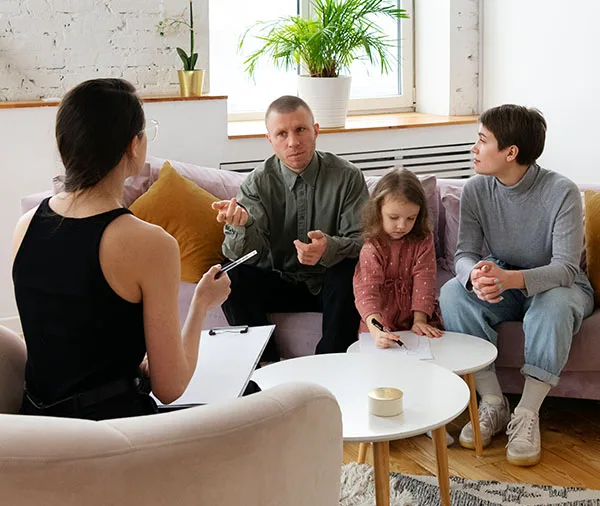How does Guided Meditation Work to Promote Relaxation and Mental Well-Being?
In the fast-paced world we live in, the pursuit of relaxation and mental well-being has become increasingly important. Amid the hustle and bustle, guided meditation has emerged as a powerful tool to find inner calm and promote mental wellness. This article delves into the intricacies of guided meditation, uncovering how it works to foster relaxation and support overall mental well-being. As we embark on this journey of understanding, we'll explore the benefits of guided meditation and its potential to complement approaches like family counseling for holistic mental health.
Guided Meditation: A Path to Inner Tranquility
Guided meditation is a technique that harnesses the power of mindfulness and visualization to lead individuals on a mental journey towards relaxation and self-awareness. Unlike traditional meditation, where individuals meditate in silence, guided meditation involves a skilled practitioner or a recorded voice providing verbal cues and imagery to guide the meditation session.

The Mechanics of Guided Meditation
- Calming the Mind: Guided meditation starts by creating a serene environment where participants can relax and let go of stress. A gentle voice guides participants to settle into a comfortable posture and focus their attention on their breath.
- Visualization: Visualization is a cornerstone of guided meditation. Through carefully crafted descriptions, participants are led to imagine peaceful scenes, such as nature landscapes, tranquil beaches, or serene gardens. Visualization activates the mind's creative and sensory capacities, transporting individuals away from daily concerns and into a calming mental space.
- Mindfulness and Awareness: Guided meditation emphasizes mindfulness, the practice of being fully present in the moment without judgment. Participants are encouraged to observe their thoughts, feelings, and bodily sensations, fostering self-awareness and acceptance.
- Positive Affirmations: Many guided meditation sessions incorporate positive affirmations or statements aimed at promoting self-esteem, self-compassion, and a positive outlook. These affirmations work to reframe negative thought patterns and cultivate a healthier mindset.
- Progressive Relaxation: Guided meditation often includes a progressive relaxation component, where participants are guided to consciously relax different parts of their body, releasing physical tension and deepening the relaxation experience.
Benefits of Guided Meditation
- Stress Reduction: Guided meditation provides a mental escape from stressors, helping to lower cortisol levels and induce a state of relaxation. The visualization and mindfulness aspects divert attention away from worries and cultivate a sense of tranquility.
- Enhanced Self-Awareness: Through guided meditation, individuals can become more attuned to their thoughts, emotions, and physical sensations. This heightened self-awareness can lead to greater emotional regulation and improved self-understanding.
- Anxiety Management: Guided meditation techniques have been shown to reduce symptoms of anxiety. By engaging the imagination and encouraging deep breathing, guided meditation activates the body's relaxation response, counteracting the fight-or-flight response associated with anxiety.
- Improved Sleep Quality: Guided meditation before bedtime can help quiet the mind and create a conducive environment for restful sleep. It can be particularly effective for individuals struggling with racing thoughts or insomnia.

Guided Meditation and Family Counselling
While guided meditation is a valuable tool in promoting mental well-being, it can also complement other approaches, such as family counseling. Family counselling near me offers a platform for addressing interpersonal dynamics, communication challenges, and emotional issues within a family unit. Incorporating guided meditation can enhance the effectiveness of family counseling in several ways:
- Stress Reduction: Guided meditation can be integrated into family counseling sessions to help all members manage stress and anxiety. This can create a more relaxed atmosphere for open and productive discussions.
- Emotional Regulation: Guided meditation fosters emotional regulation, a crucial skill for healthy family interactions. Learning to manage emotions through mindfulness can lead to more constructive communication and reduced conflicts.
- Shared Experience: Participating in guided meditation together as a family can create a shared experience that promotes bonding and mutual support. It can also serve as a nonverbal way of connecting and understanding each other's emotional states.
- Conflict Resolution: Guided meditation can be used as a tool for conflict resolution within family counseling. It encourages individuals to approach conflicts with a calmer and more empathetic mindset, facilitating productive resolutions.
Conclusion:
Guided meditation serves as a voyage to inner peace and self-discovery, enhancing mental well-being through mindfulness, visualization, and positive affirmations. Its benefits extend beyond personal relaxation, with potential applications in family counseling to promote harmonious relationships and effective communication. As we navigate the complexities of modern life, guided meditation offers a beacon of tranquility, helping us uncover the depths of our minds and fostering a state of well-being that ripples through our lives and relationships.
Comments
Post a Comment